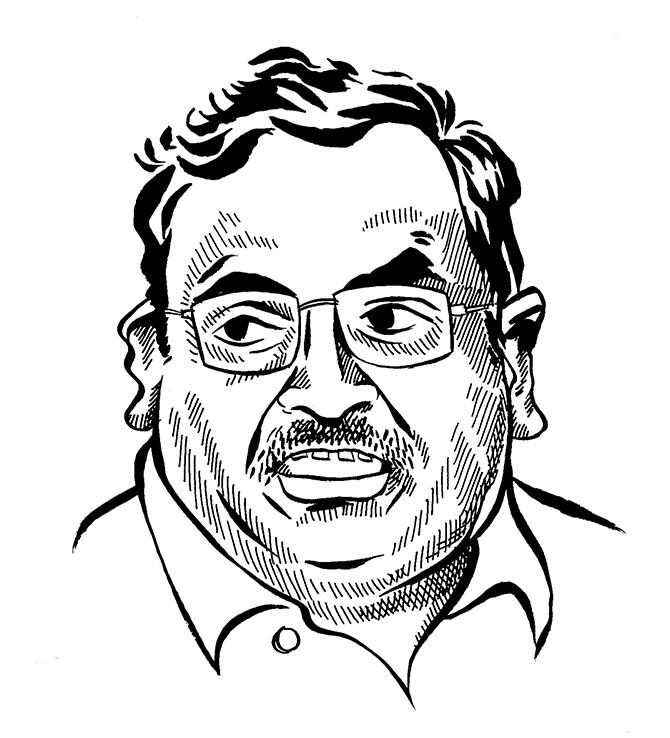In Nagpur Central Jail's 'Anda Cell' languishes a 90% disabled, ailing, professor, sentenced to life imprisonment for Maoist links, reports Jyoti Punwani.
Illustration: Uttam Ghosh/Rediff.com

As the harsh Nagpur winter approaches, the inhabitants of the city's Central Jail brace for a period of discomfort.
One among them will find it particularly hard to cope. Diagnosed with permanent post-polio paralysis of the legs, he is 90% disabled, dependent on a wheelchair and needs help to perform necessary bodily functions.
Additionally, he has high blood pressure, spinal pain and a heart problem.
Professor G N Sai Baba of Delhi University was convicted in March under the Unlawful Activities (Prevention) Act for having links with Maoists, and sentenced to life imprisonment by a sessions court in Gadchiroli.
He is currently in solitary confinement in the notorious 'Anda Cell'.
The jail authorities have made no allowance for his disability.
They do not allow him to wear a lungi brought by his wife instead of the pyjama given by the jail, which he cannot tie as his left hand is paralysed.
Neither do they give him bland food. His inability to digest the spicy jail food has made him cut down on intake, thereby affecting his health further.
From childhood, the professor has been extra sensitive to the cold, which causes him severe muscle pain, said his brother Dr Ramdev.
In a letter to his wife Vasantha Kumari written on October 17, which she received on October 27, Professor Sai Baba writes: 'Already I am shivering with continuous fever. I do not have a blanket. I do not have a sweater/jacket. As temperature goes down excruciating pain continuously in my legs and left hand increases. I am living here like an animal taking its last breaths.'
On Saturday, October 28, the jail authorities finally agreed to give him a small blanket brought by Dr Ramdev, after twice declining one brought by Vasantha and again by his lawyers.
While the authorities refuse to provide him any attendant, two Adivasis who were also convicted along with him, are voluntarily helping him.
When he was sentenced in March, Professor Sai Baba had just emerged from the ICU in a Delhi hospital and was due for pancreatic surgery in three weeks.
The doctors had then said that a delay in surgery would cause infection in his pancreas.
A recent report by the Nagpur Government Medical College and Hospital showed stones in Professor Sai Baba's kidneys and gall bladder. No treatment, however, is being given to him.
His brother said that the medicines they bring for him were prescribed in March and may not be appropriate for his present ailment.
In his letter, Professor Sai Baba has complained that lifesaving medicines supplied by his family are not given to him regularly, hence he frequently becomes unconscious.
Every trip to the hospital is excruciatingly painful for Professor Sai Baba.
According to his wife, the jail authorities do not provide a vehicle with a low chassis, and the security guards accompanying him lift him roughly in and out of the vehicle.
In the hospital too, there are no attendants for him.
Now, he has refused to go to the hospital unless the authorities inform his lawyers whenever he is taken there, so that a family member can accompany him.
The Government Hospital where he is taken had treated him during his earlier stints in jail as an undertrial.
The hospital had then given in writing that they did not have the facilities to treat him and that he should be treated in a super speciality hospital like AIIMS.
Professor Sai Baba was first arrested in May 2014 and spent 14 months in Nagpur Jail before being released on bail on medical grounds by the Bombay high court, after the sessions court had denied him bail.
In December 2015, the sessions court ordered that he be arrested again. This time, he had to go to the Supreme Court for bail, which he got after three months.
When he was first arrested, he could move around on his own on his wheelchair. Both his stints in jail worsened his health and his mobility, making him totally dependent on others.
All his time outside jail was spent in and out of hospitals.
A known opponent of the Centre's policies in Bastar, where tribals are being forced to give up their land and forests so that corporations can use the area's mineral resources, Professor Sai Baba was convicted on the basis of evidence found on his computer.
However, said his wife, his computer and other material from his house were taken away in an open bag, not a sealed one, as per rules.
The appeal against his conviction has yet to come up for hearing.
In an earlier interview with Rediff.com, Vasantha had said that her husband had turned down two offers by the police to compromise and be set free by signing on some papers, the contents of which he did not know.
The professor had told Rediff.com, on being asked whether he would stop fighting for Adivasi rights after his two jail experiences: "How can any democratic-minded person not speak out against the genocide of Adivasis? How can we be silent when we see millions of Adivasis being displaced? Do we have a choice whether to speak or not?"
His family -- wife, college going daughter and old mother -- survive on the half-salary he continues to receive from his college, and on donations by his friends and colleagues.
Says Vasantha: "I have visited him only thrice in these eight months. In prison, we get permission only to talk on the phone to each other for 15 minutes. Between us are an iron grill and a stained, dirty fibre glass barrier."
"Beyond these, all I can see is a shadowy figure in a wheelchair. It’s not just us; the families of all convicts face this. We all come from very far to meet our family members, and such meetings leave both sides traumatised."










